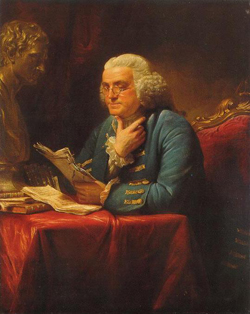Essays On Benjamin Franklin
|
| updated |
Copy Link Code
|
 In the many writings of Benjamin Franklin a legacy of wit, sensibility and virtue survives. Franklin was a master of many topics including science, politics, diplomacy and business. He began his work as an apprentice in his brother's print shop in Boston at the age of 12 and within only a few years Franklin began his foray into writing. Sending in anonymous letters, the writings of Ben Franklin soon appeared in his brother's newspaper, The New England Courant, under the nom de plume Mrs. Silence Dogood. Although his brother was infuriated when Benjamin admitted to being the author, the Dogood letters had brought substantial attention to the Courant. During the early years of Franklin's ownership of a print shop in Philadelphia, he began to publish what would become his most famous periodical, "Poor Richard's Almanack". In this annual publication, Benjamin Franklin, writing under the nom de plume Richard Saunders, included meteorology, astronomy, and astrology as well as poetry, essays and satire. Franklin's pragmatic and humorous style made his writing famous throughout the European and colonial world.
In the many writings of Benjamin Franklin a legacy of wit, sensibility and virtue survives. Franklin was a master of many topics including science, politics, diplomacy and business. He began his work as an apprentice in his brother's print shop in Boston at the age of 12 and within only a few years Franklin began his foray into writing. Sending in anonymous letters, the writings of Ben Franklin soon appeared in his brother's newspaper, The New England Courant, under the nom de plume Mrs. Silence Dogood. Although his brother was infuriated when Benjamin admitted to being the author, the Dogood letters had brought substantial attention to the Courant. During the early years of Franklin's ownership of a print shop in Philadelphia, he began to publish what would become his most famous periodical, "Poor Richard's Almanack". In this annual publication, Benjamin Franklin, writing under the nom de plume Richard Saunders, included meteorology, astronomy, and astrology as well as poetry, essays and satire. Franklin's pragmatic and humorous style made his writing famous throughout the European and colonial world.
The scientific papers of Benjamin Franklin include numerous ideas for the design of experiments on everything from electricity to temperature control. In 1750, Franklin published his thoughts on an experiment to prove the electrical nature of lightning. Although a French scientist named Thomas-Francois Dalibard beat him to the punch in May 1752 by using a tall metal rod to draw sparks from stormy clouds, Franklin would pull off the same trick with a copper key attached to a kite one month later and steal the imagination of people worldwide. Some of the most important Benjamin Franklin papers are simply the letters he shared with the leading doctors, diplomats and physicists of the time. Franklin was acutely aware of the lack of technology in his age and expressed outright jealousy of the future he foresaw with the commonplace use of electricity and medical innovation. His shared contemplation with experienced seamen also helped to establish recognition for the Gulf Stream of the Atlantic which had previously troubled and slowed ships sailing westward across the ocean.
The Autobiography of Benjamin Franklin is perhaps the greatest source of intimate information of the life of early America's elder statesman. Writing at first to his own son, William Franklin, and later to all future Americans, Franklin laid out the virtues by which he felt a man could become better and more in tune with the world as well as explaining his experience through decades of fame and fortune as a businessman, inventor, diplomat and Founding Father. Many essays on Benjamin Franklin depend on this autobiography as well as the contemporary reflections of his admirers and acquaintances. By the time the First Continental Congress had met, Franklin was already a world renowned thinker and experienced diplomat who made for an obvious choice to represent America in France. The alliance Franklin established with the French turned the tide of war in the rebels' favor and his leadership in diplomacy shone again when the Treaty of Paris was signed in 1783, ending the Revolutionary War. The wisdom he used to conquer the games of diplomacy was shared only in the writing of Benjamin Franklin.
